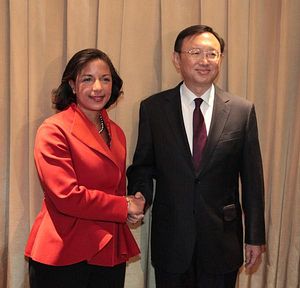We’re still over six months away from Chinese President Xi Jinping’s visit to the United States, but you wouldn’t know it from the number of bilateral meetings being billed as in preparation for Xi’s arrival. The latest, a meeting between U.S. National Security Advisor Susan Rice and Chinese State Councilor Yang Jiechi in New York City, provides some interesting insights into focal points for the big bilateral summit in September.
Both China and the U.S. released reports summarizing the Rice-Yang visit, and the focus was decidedly global. Instead of touching on bilateral subjects, both governments directed attention to U.S.-China cooperation on global issues: the Ebola crisis, the North Korea nuclear issue, the P5+1 negotiations with Iran, and ensuring stability in Afghanistan.
The emphasis on Afghanistan is especially interesting, as it marks a new area of cooperation between Washington and Beijing. The Diplomat has previously reported on the signs China is willing to take a more active role in mediating between Afghanistan and the Taliban, including bringing Pakistan to the negotiating table.
The U.S. role in all of this has been unclear, with some reports indicating that the U.S. has plans to participate in negotiations with Afghan officials and Taliban leaders – which was denied by U.S. government officials. The prospect of a negotiation process with the Taliban led by China and sanctioned by the U.S. could be a critical development for Afghanistan’s future.
Details on possible U.S.-China cooperation on this front remain murky. The statement from National Security Council spokesperson Bernadette Meehan made clear that Rice and Yang discussed Afghanistan in their meeting, but did not offer any additional details. The report from China’s Foreign Ministry (translated here by Xinhua) did not mention Afghanistan at all. But given the shared concern for Afghanistan’s stability, the U.S. and China are undoubtedly having serious discussions on how to coordinate their efforts.
Official summaries of the meeting paid more attention to a long-time point of emphasis: the North Korean nuclear program. We’ve entered another round of speculation as to when (if at all) North Korea will conduct another nuclear test. When it comes to North Korea, U.S. administrations are always eager to show they have buy-in from China – even if verbal commitments never translate to action (something my colleague Ankit and I discussed in more detail in our latest podcast, featuring Joel Wit). This time around, according to the NSC, Rice and Yang “agreed that North Korea would not succeed in its twin pursuit of nuclear weapons and economic development.”
The Chinese summary, predictably, was far more muted, saying only that “China adheres to the principles of denuclearization and peaceful settlement through dialogue and negotiations.” Yang added his hope “that all related parties will exercise restraint, avoid any irritating rhetoric and acts, and jointly maintain peace and stability on the peninsula.”
Taken together, these two reports don’t spark much hope for a breakthrough on how to approach North Korea’s nuclear program. The relative length given to the North Korea issue in each side’s statement shows that both Beijing and Washington are focusing on this issue in the lead-up to Xi’s visit. However, the problem is that the two sides have different goals for what a breakthrough would look like. China wants a return to the Six Party Talks or another form of dialogue, while Washington wants greater Chinese commitment to the sanctions regime and/or a solid North Korean concession on its nuclear program as a precursor to talks.
U.S.-China relations have always had a global component, but this trend is only increasing as China becomes more influential on the world stage. In Meehan’s statement, the very second sentence underlines that Rice and Yang “agreed to strengthen coordination on regional and global challenges.” The U.S. and China have different agendas for the international order (see, for example, my piece on China’s vision for the U.N.) but when it comes to various security challenges, whether pandemics like Ebola or the threat of Afghanistan becoming a terrorist haven, there is much common ground.

































